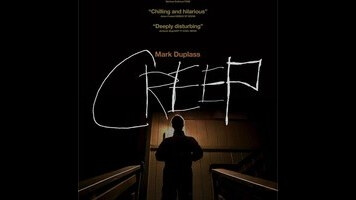Mark Duplass’ twisted two-hander Creep is more admirable than enjoyable

The new oddball thriller Creep wastes no time in establishing its premise: Aaron (Patrick Brice) comes across a Craigslist ad offering $1,000 for filming services, with the sole addendum “discretion is appreciated.” After driving out to a cabin in a remote mountainous town, he meets Josef (Mark Duplass), the upbeat, slightly goofy guy who hired him. It seems that Josef, dying of cancer, is hoping to make a video of a day in his life to leave behind for his unborn child, à la the Michael Keaton weepie My Life. Aaron, wielding a small camera, begins following him around as the two embark on what Josef hopes will be a spiritual and heartfelt series of events. However, Aaron is soon put off by Josef’s strange behavior, and at the end of the day, he’s ready to call it quits. But Josef doesn’t want to give up on their time together—and Aaron quickly finds himself in a very different situation than he expected. (Perhaps no one informed Aaron he’s appearing in a film called Creep.)
The film is shot to resemble found footage, revolving around the interplay between these two men, and to say the end result makes for less-than-compelling cinema is not to condemn the interesting ideas at work behind the story. The first weakness is the typically scattershot style of the found-footage conceit, an already difficult technique to invest with much visual flair. It has historically worked best for horror, because the limited first-person frame and “you are there” breathlessness can, when successful, create a tense and unnerving atmosphere. Creep, despite a couple of decent scenes that take advantage of this tactic, is more interested in the psychological makeup of its two characters, and thus doesn’t offer much in the way of narrative or optical benefits from the choice. The fact that Brice manages to work in some good-looking shots doesn’t compensate for the general flatness.
Similarly, Brice, a first-time feature filmmaker (his follow-up, the nervy comedy The Overnight, just hit theaters), isn’t quite up to the job of portraying a man who finds himself strangely affected by his deceptive subject. Duplass and his preferred acting style—based in meticulous story beats but heavily improvisational in dialogue—never quite find a partner in Brice, who retreats into his character’s befuddled silence too often to create a fully realized person. Whereas Josef’s gradual changes come across as organic and real, Aaron’s behavior suggests that it’s not his ostensible new friend that he’s holding at bay, but the film itself, too. Later video diary confessions go some way toward lending the character nuance, but it never alleviates the problem of this disconnect.
By the end, Creep has revealed itself to be a film about the fine line between genuine emotion and manipulative artifice, and the extent to which we can err simply because we think the former is more worthwhile than the latter. If someone is misleading you, how much does it matter if they truly believe the connection between you is real? The film ultimately retreats into a more conventional thriller explanation, despite a few clever alienating effects that grant the viewer some distance where traditional horror would push for intimacy. The movie is more intriguing experiment than successful cinema. Some people may indeed be fascinating characters—but that doesn’t mean you want to spend much time with them.
Creep is available now on iTunes. It can be streamed through Netflix starting July 14.